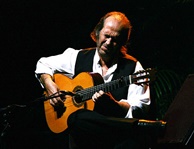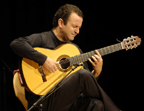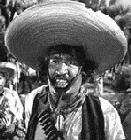Welcome to one of the most active flamenco sites on the Internet. Guests can read most posts but if you want to participate click here to register.
This site is dedicated to the memory of Paco de Lucía, Ron Mitchell, Guy Williams, Linda Elvira, Philip John Lee, Craig Eros, Ben Woods, David Serva and Tom Blackshear who went ahead of us.
We receive 12,200 visitors a month from 200 countries and 1.7 million page impressions a year. To advertise on this site please contact us.
|

|
|
Is It Important
|
You are logged in as Guest
|
|
Users viewing this topic: none
|
|
Login  | |
|

   
z6
Posts: 225
Joined: Mar. 1 2011

|
 RE: Is It Important (in reply to Paul Magnussen) RE: Is It Important (in reply to Paul Magnussen)
|
|
|
I wouldn't venture to offer advice on this but I am curious:
Paul, this guy who had figured out and learnt the Paco tunes. How long did it take him to 'get a clue'?
Surely, once someone pointed out the various components of the music he had mastered would he not then be equipped with a 'paco-heavy' repertoire to mix and match?
I'm sure it was an eye opener for him but, if he could play paco's stuff, then he does already 'know' 'the basics'. He just needs good friends to unravel or deconstruct what he's doing. Plop it into other contexts and Bob's yer uncle, no?
The assumption of gates through which we enter makes sense to me, from a technical perspective, but musically, one cannot do sht until one has a technique, even if that technique only really needs a single finger banging it out.
The techniques one learns from paco surely allow one 'the hands' to then do all the cool flamenco stuff, like accompaniement. (Actually doing it is another matter, of course, but without the facility nothing happens.)
I'm saying this because I cannot imagine a half-assed rendering of any of paco's music making any sense at all. If the guy stunk then the point would be moot anyway, but if he had the chops to pull it off then he is indeed the proof that one does not have to follow some well-trodden path from early to late or simple to complex. (And complexity takes many guises.)
I expect if we could all go down to closeby bars we would learn how to play proper rhythm guitar but without contact these great masterpieces are very attractive. And they are full of 'it': the fabulous techniques that consitute flamenco guitar techniques.
I never ever feel like playing 'traditional' flamenco because I just don't. I like all the cool effects, the crunching harmonies on my snare guitar, of what is, to me, 'modern'. (At least I am told it is modern. Sabicas played some very cool stuff but I won't get around to it until other, more modern, things are learned.)
The traditional stuff was so successful, in being ripped off and orchestrated, that so much of it sounds like an edition of Come Dancing from 1965 to me.
We are constantly being informed here that flamenco is cante, or that accompanying singers is the deal or that banging it out for dancers is the thing. (Or, more often, that playing for most dancers is a nightmare and that singers are hard to follow.)
But it is also a bunch of people who take a different course, maybe a looney course; hearing a godlike guitar sound, knowing it is impossible to play that well, then maybe some years later finding out how clever paco was when he he wrote the music, making it 'easy' (given thousands of hours of application).
Let's not forget that much of the best of it happens in bars full of drunk revellers.
People who do not live in that environment have the advantage of being able to learn such music (pdl) in private, and ignorance, and remain unaware that they are revealing themselves so nakedly.
But chops is chops mate. I see no evidence that copying paco could be a bad thing. I get that flamenco is huge and deep and goes on forever and ever, but it's not that 'hard' to learn all the 'actual stuff: That would be the fun part that happens when 'making' music.
Seems to me that speed is a basic requirement for the flamenco guitarist. Paco's stuff says 'play this really slowly, over and over, relaxed, and it's a breeze'.
This is, I believe, important. Doing nothing but straight, simple, rhythm guitar, in compas with one finger, how long would it have taken someone with the correct basics to play those paco tunes? The bizarro-world version of your paco guy?
Aren't we talking about the difference between years and minutes?
Of course compas is important. But sometimes here, it seems, with all the counting and the accents and the endless arguments, that we forget it's really just the beat (or groove or vamp or whatever name we give it). The same beat that little kids dance and sing to.
It's very hard to learn that stuff in isolation. But only because one is isolated. And the learning is then endless anyway. If we cannot feel the groove then we're arhythmic.
I reckon many of us would makes arses of ourselves upon entering a 'jam'. But anyone who can play paco's stuff will pick it up, very easily. It's only music, after all.
|
|
|
|
REPORT THIS POST AS INAPPROPRIATE |
Date Mar. 20 2014 13:26:27
 |
|

   
Ricardo
Posts: 14806
Joined: Dec. 14 2004
From: Washington DC

|
 RE: Is It Important (in reply to z6) RE: Is It Important (in reply to z6)
|
|
|
quote:
But anyone who can play paco's stuff will pick it up, very easily.
seems simple enough, but at is turns out it is all about THIS, and it appears that this is simply not true. What happens is guitar players from other genres, already with nimble fingers, tend to go for the notes and fingerings, and without the base, their interpretations are lacking 'something" and it's super obvious to some listeners, not so obvious to others. On the surface it might appear "wow they are doing it , playing paco's music"...but underneath is lurking something quite dark, and that is simply that they don't really know or understand the music.
I dont want to sound mysterious so I will just point out the elephant in the room, it is COMPAS. If you can't strum basic chords for hours in the flamenco style, AND ENJOY DOING IT....then something is fundamentally wrong. No one denies the beauty of advanced modern (or traditional) flamenco guitar compositions, and all are free to try to learn them and ignore ALL THAT WENT INTO COMPOSING THEM...but so long as it is done honestly. Can someone learn flamenco compas FROM an advanced compostion? Of course, but this individual has to be some sort of true rhythmic master that they learned from some other discipline. Perhaps a jazz guy...rock guys not so easy, and classical players, NO OFFENSE, not likely. It is simply not part of the discipline. Brazilian players...yes they can do it. Cuz their music is innately rhythmic anyway...and they understand chords too. They have much better chance at learning what is behind a fancy modern flamenco piece because of how they will approach learning it.
To put it simply, very little of Paco's music is outside of the scope of your average player. But people are going for the fast runs etc. Entre dos Aguas is a simple piece, any beginner of flamenco can learn most of it. But then you come to the picados and of course nobody can do that thing. But in the bigger picture of music, it is not so important. When we see a player with nimble fingers fudging compas here or there, trying to play Paco "note for note" instead of a WELL played single falseta or a mix of a few, then it is obvious what is going on. Saddly this type of player can't get the basics so easy, they have to strip down EVERYTHING...and that means throwing all that work in the trash can, and start OVER...from scratch. If you can't believe it I offer MYSELF as an example, and ERIK has told the same story a dozen times, and I have seen it with countless others. There is something to this issue very serious and we on foro have hope for every student to be going for the "real thing" and not just skim the surface, even though there is nothing wrong with that if you just play for fun on your bed.
_____________________________
CD's and transcriptions available here:
www.ricardomarlow.com
|
|
|
|
REPORT THIS POST AS INAPPROPRIATE |
Date Mar. 20 2014 14:30:50
 |
|

   
Kalo
Posts: 400
Joined: Jan. 25 2011

|
 RE: Is It Important (in reply to Kalo) RE: Is It Important (in reply to Kalo)
|
|
|
quote:
I dont want to sound mysterious so I will just point out the elephant in the room, it is COMPAS. If you can't strum basic chords for hours in the flamenco style, AND ENJOY DOING IT....then something is fundamentally wrong.
Well, I enjoy it and rather then try doing fast picado stuff...I would much rather get the rhythm, soniquette more than ANYTHING!!!
quote:
But in the bigger picture of music, it is not so important. When we see a player with nimble fingers fudging compas here or there, trying to play Paco "note for note" instead of a WELL played single falseta or a mix of a few, then it is obvious what is going on.
I LOVE THIS QUOTE!!! I get it and I agree on getting down a well played single falseta or and or mixing a few....Thanks so much for this value information!!!
quote:
If you can't believe it I offer MYSELF as an example, and ERIK has told the same story a dozen times, and I have seen it with countless others. There is something to this issue very serious and we on foro have hope for every student to be going for the "real thing" and not just skim the surface, even though there is nothing wrong with that if you just play for fun on your bed.
Ricardo, I love this statement and even though I play for fun, I still want to go for the "real thing"!
Kalo
|
|
|
|
REPORT THIS POST AS INAPPROPRIATE |
Date Mar. 20 2014 15:12:25
 |
|

   
Paul Magnussen
Posts: 1805
Joined: Nov. 8 2010
From: London (living in the Bay Area)

|
 RE: Is It Important (in reply to z6) RE: Is It Important (in reply to z6)
|
|
|
quote:
Paul, this guy who had figured out and learnt the Paco tunes. How long did it take him to 'get a clue'?
Surely, once someone pointed out the various components of the music he had mastered would he not then be equipped with a 'paco-heavy' repertoire to mix and match?
The problem was, he’d copied the Lucía stuff note for note, but he didn’t understand it: there were all sorts of mistakes in accentuation. Nor, unless I miss my guess, could he have varied one of the pieces even slightly, without making a mess of it.
As to how long it took him to get a clue, I have no idea: I never saw him after the two-week course. Paco of course tried to put him on the right track, and perhaps he succeeded, who knows?
This kind of thing isn’t new: the same happened with Django. But the number of players who can improvise in that style like Django, you can count on the fingers of one hand.
quote:
I'm sure it was an eye opener for him but, if he could play paco's stuff, then he does already 'know' 'the basics'. He just needs good friends to unravel or deconstruct what he's doing. Plop it into other contexts and Bob's yer uncle, no?
What Ricardo said.
_____________________________
|
|
|
|
REPORT THIS POST AS INAPPROPRIATE |
Date Mar. 20 2014 16:03:50
 |
|

   
z6
Posts: 225
Joined: Mar. 1 2011

|
 RE: Is It Important (in reply to Ricardo) RE: Is It Important (in reply to Ricardo)
|
|
|
Ricardo, I don't disagree. But you are characterizing the 'stock' Paco impersonation.
The post, that used the session guitarist doing his Paco impression, did not avail us of the standard of that performance.
Of course it isn't easy, but anyone who can give a convincing Paco impersonation is entirely unhindered. Would he not be able to 'jam along' once shown how to? I'm, again, not suggesting that jamming along is all there is to it but we cannot have it both ways. It is a lifelong endeavor, for sure, and we have the professor out there showing us the dangers of actually performing Paco's stuff in front of people, but one of the beauties of the form is that one indeed does not need a phenomenal technique to do just fine. But being able to peform paco's falsettas would make the job a joy, no? We must assume that the guy did not sound like a big embarrassing mess. And if he did not, then who would claim that learning 'something else' first would be the right way to go? indeed, one the the most important aspects of this form is confidence, or belief. This guy got a chance to learn before all the wise guys burst his bubble. And how far do we go? Crisp rasgs man, but... Strong picado at 160... but what good is that? Ooh, the separation, the flow of that alzapua, but it ain't....
But if we simply assume a bunch of bum notes then of course everything else will be the only stuff that matters.
Now we have people posting that are assuming certain tunes in order to further prove the underlying point that these threads often make. That it is all misunderstood, all a mystery unless one is enlightened. And of course that is the case. But we should be careful about our assumptions, and this old to new assumption does not hold. There can be no physical reason why parroting traditional stuff is superior when learning. (Given a gitano kid at one end and an old codger in Arkansas in the other.)
We have a session guitarist who aped some paco and then thought he should go on a course and actually learn flamenco. If his paco stunk then the point is not even relevant as he would stink at 'basic stuff' as well.
And we know he could leave out the super fast runs but still provide an authentic peformance. What Paul said sounds exactly what some people would say about Paco himself, many years ago. Ah, rumba, that's all very well but can he play flamenco? This was said many times about him. Of course, he was flamenco. As are many drenched in the culture.
However, another guy here has said that IF the tunes were.... then he would be far from understanding. So what tunes would take him closer? None. He had no idea, probably, that this music was structured the way it was, and has an underlying depth that he was about to become aware of.
But it's not a single ladder of enlightnment. For the guitarist there are many 'attractive things' in flamenco.
Grisha can play paco well enough and he's not paco himself. And he's not a gitano.
I have no idea what his level of proper flamenco is. I have only heard his recital pieces. But I'd doubt that any quality flamenco player would hear him and not know that he has the ability to master it just as well as anyone else. In fact, and this is the point, with that level of technique it will be easier for him to learn maybe how paco got there, or how others are getting to where they are.
Much easier. Technique matters. If it didn't we wouldn't see so many brain-damaged comments wherein people actually seem angry at picado for being difficult.
I just wanted to cut through this snobbery I see that elevates 'real' flamenco above all. But, as a guitarist, there is world inside each of paco's tunes even before we get to all the stuff that makes it flamenco, and not just 'a tune'.
Now, again, there is nothing wrong with that and if we assume the session guitarist grimacing at the 'hard parts' then its all fine and good. But if we assume some level of mastery then this mastery is much more difficult to aquire than the ability to accompany, or string our little riffs together. The numbers do not lie. Whenever I've been in a room full of flamencos, all of them could keep time and seemed to know (almost all of the time) where they were and what they were doing, but a higher level of technique, as required to play paco, is very rare indeed. (Remember that here we are placing the simple ability 'to accompany' (let's say in compas but without any pretensions) against a very advanced guitar technique unaware of its own musical origins.)
The basic technical toolset in such circumstances is very wide. The relaxation has to be there. The awareness (that exists within the music whether this session guy knows is aware of it or not) is there somewhere. Or it would be dreadful.
The path is therefore clearer than it might otherwise have been. (If one is pursuing guitar as the medium through which one might learn flamenco.)
I see here often people at pains to point out how far someone else is from 'understanding' and sometimes they use examples.
I think this is a bad example. But I would rather be able to give a convincing paco impersonation than accompany some guy shouting in my ear.
Had I access to a guy that would shout in my ear and point out what I need without sounding like he was putting me down then I'd probably do that, and I'd guess the session guy would as well.
But if all one has acces to is 'technique' as in copying one's favourites, and if one can then pull that off, I think it is disengenuous of others to imply that the guy, or the effort, is miles and miles and miles away; especially if he played pieces that knowital fuddlebutts consider to be evidence of the hallmark of flamenco ignorance.
Ricardo, consider your own musical development. Your own mastery of the genre started with music wildly different. The common element has been the guitar. One might say that strictly speaking your flamenco education started long before you knew you were a flamenco. So, that 'previous' experience cannot not inform your current state as a musician. Indeed, the very thing that attracts me to your music is the freshness, that it is 'in' flamenco but transcends the form in quite a subtle way.
But pointing to the session guy as evidence of the great unattainable is about as misguided as listening to your music and then only hearing the influence of Nunez. (And this also interests me as I heard your album before I had heard any Nunez. So, for me, I sometimes hear quotations, and I love them and they show me how to 'morph' things around a littlebut others might hear something else, or have a different slant on what they hear. It all evolves and an advanced technique is the best thing one can have. Everything else is just 'doing it'. (Bad or good.)
And on rebuilding and starting from scratch. I am familiar with that. One of the things I like about flamenco is I always feel like a beginner, like I just started, even though Flamenco has transformed my relationship with my instrument.
Finally, as it's a lot to assume that this session guy could really play it like paco we could assume that he did it at 90% (or less) of the speed.
And really finally, the guy was there at the wokshop, learning. He had no idea that as soon as one attempts to play paco to guitarists that 'know' flamenco one is written off. For my part, I'm impressed when I hear people play such stuff. I don't care what else they can do. Whatever else they can do is that, and this is this.
So, how did the session guy do by the end of the course. Did he progress well?
|
|
|
|
REPORT THIS POST AS INAPPROPRIATE |
Date Mar. 20 2014 16:05:05
 |
|

   
mark indigo
Posts: 3625
Joined: Dec. 5 2007

|
 RE: Is It Important (in reply to Paul Magnussen) RE: Is It Important (in reply to Paul Magnussen)
|
|
|
quote:
if you mean "old" or historical before new/contemporary then not necessarily.
Er, yes, but it’s all wrong. That is, I think I disagree.
You may not need to learn to play the old stuff note for note, but you do at least need to understand it; because it’s the basis of the new stuff.
If you listen to early Lucía, you can hear how he’s taken the ideas of Ricardo and Sabicas and Esteban Sanlúcar and developed them.
There’s a famous story about how Lucía once had to accompany Mairena, who was less than enthusiastic about the modern style of guitar. So he thought, What would Mairena want? And the answer was, He would want Melchor.
So Lucía deliberately played like Melchor, and Mairena congratulated him afterwards.
I completely agree with what you say about the old stuff, if nothing else it sure comes in handy when you play with someone who wants to hear that.
And yes, I hear the synthesis of the old masters in the early Paco stuff.
And I know the story of Paco accompanying Mairena, but hadn't heard those recordings, so thanks for the links.
the way I see it (or hear it) there isn't a massive split between "modern" and "traditional" - the contemporary expression of the tradition includes all the old stuff, and adds the new stuff to it.
And "traditional" doesn't have to mean purely historical.
_____________________________
|
|
|
|
REPORT THIS POST AS INAPPROPRIATE |
Date Mar. 20 2014 17:58:01
 |
|

   
z6
Posts: 225
Joined: Mar. 1 2011

|
 RE: Is It Important (in reply to Mark2) RE: Is It Important (in reply to Mark2)
|
|
|
Hi Mark.
Yes, he said it later (or I misread his earlier post to which I added a comment). But when he said that the guy was misplacing accents, etc., then that's entirely different. My assumption was that getting all of those things right is part of technique, so the technique itself would contain the seeds of flamenco and thus, with an advanced 'technique' it would be much easier to absorb flamenco.
It's kind of getting it arse about face but I think a good technique would be very advantageous to everything one would need to know to really learn flamenco. Learning it completely outside the world of flamenco (from videos, here, etc.) is hard enough but being able, for example, not only to handle the basic techniques to an advanced level but to change between them with the ease that paco's music requires would speed up the process immensely.
I understand that this is a long way from flamenco but such attempts at technique seem too often ridiculed (I'm not suggesting Paul did that, by the way), in terms of development.
I expect that's because it does seem so out of place; as if the wrong muscles are developed first, but outside of that world what can we do but figure things out and try to play them?
Learning to play what one really loves most makes sense. And maybe it's better not to know how great, or difficult, something is so that one might first imagine or dream one can play it without being told too early that it's all impossible and in the realm of the gods.
The most striking thing to me about paco's music is that many of the licks that I had thought were impossible really are quite easy (with much application and humility). I would never have known that had I not tried to figure things out and could not have done so without the aid of slowing the music down a lot.
Alzapua, to my 'virgin' ear sounded almost like magic, for example, but now it's not. It would never have occurred to me to even try to play so fast, had my research/listening/practise, not led me there of its own accord.
It would a strange road indeed for someone to be able to ape paco but unable to demonstrate knowledge of how to perform flamenco. But we all develop in the ways available to us.
|
|
|
|
REPORT THIS POST AS INAPPROPRIATE |
Date Mar. 20 2014 18:22:25
 |
|
 New Messages New Messages |
 No New Messages No New Messages |
 Hot Topic w/ New Messages Hot Topic w/ New Messages |
 Hot Topic w/o New Messages Hot Topic w/o New Messages |
 Locked w/ New Messages Locked w/ New Messages |
 Locked w/o New Messages Locked w/o New Messages |
|
 Post New Thread
Post New Thread
 Reply to Message
Reply to Message
 Post New Poll
Post New Poll
 Submit Vote
Submit Vote
 Delete My Own Post
Delete My Own Post
 Delete My Own Thread
Delete My Own Thread
 Rate Posts
Rate Posts
|
|
|
Forum Software powered by ASP Playground Advanced Edition 2.0.5
Copyright © 2000 - 2003 ASPPlayground.NET |
0.109375 secs.
|


 Printable Version
Printable Version













 New Messages
New Messages No New Messages
No New Messages Hot Topic w/ New Messages
Hot Topic w/ New Messages Hot Topic w/o New Messages
Hot Topic w/o New Messages Locked w/ New Messages
Locked w/ New Messages Locked w/o New Messages
Locked w/o New Messages Post New Thread
Post New Thread